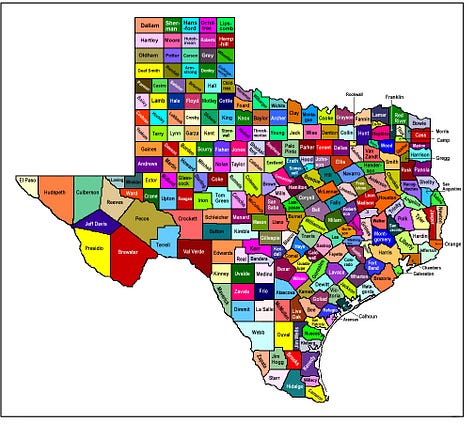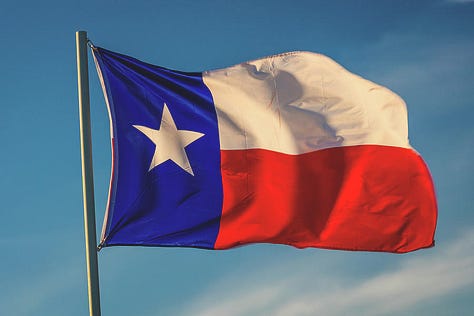I have a fun idea. I’m going to write about Texas and Texans.
Friends who have known me for a long time have a standard reaction when I say, “I have a fun idea!” They roll their eyes and say “Uh-Oh.”
I’ve had a lifelong relationship with the state of Texas. From both the inside and the outside. My Father was born here. I went to University here. I’ve had various work stints here over the years. I have lived here now, this time around, for over 7 years. I have traveled the state end to end. I have many close friends and family throughout the Great State of Texas (as Texans proudly call it).
I’ve also lived away from Texas for long periods in my life—often in other states that don’t have a particular fondness for Texans. Colorado, where I moved to Texas from, is one of those states. With all of that said, I believe I can write about the state, its resident, and its essence with some level of both expertise and objectivity.



Texas is a unique place in so many ways, both positive and negative, that it’s impossible to do it justice in just one essay. I endeavor to describe Texas and Texans with honesty, experience, a large bottle of salt, and my own sense of self-deprecating humor. Most of the things I say and describe about Texans, I can claim as my own behavior from time to time.
I hope you enjoy and maybe even learn a few things about this most loved, most vilified, most proud, most unique, 2nd largest and 2nd most populous state in the Union.
Weeds
Not the capital “W” Weed. I’m talkin’ bout those every day go anywhere grow everywhere weeds.
Weeds are rugged. They survive drought and floods and fucking mowers and pesticides. You can’t burn them out. People spend lifetimes fighting their spread. They thrive in the worst weather, hardscrabble soil conditions, and dogshit. Some are really loud, outrageous and beautiful. They show up suddenly. One day your garden is pure with the vegetables in perfect little rows. Bam! A big, honkin’ weed pops up along the back row—just far enough in the back that you really have to work to get it out by the root. Or your morning walk is suddenly different one day. Orange and yellow flowers rimmed with a rusty red, suddenly all up in the field you barely notice most mornings. They might be native—but they often aren’t—their seeds drift in on the wind, are carried in on an animal’s back, or on equipment carried in the bed of pickup truck bed.
Land Management
Historians point to the mid-late 1800s in Texan as a point at which the indigenous and native plants began to change. Barbed wire proliferated to keep sheep and cattle from each other—and to keep cowboys and shepherds from each other but that’s a whole ‘nuther essay. The fences trapped seeds along their lines and over time created a new home for invasive plants in these wind breaks where once only an occasional live oak interrupted the endless pastures.
One obvious and spectacular manifestation of how this change in land management affected plant life is the Mountain Cedar, which has been in Texas for thousands of years. Before people settled the area, much of the Texas Hill Country resembled savannah with grasslands dotted by oak trees stretching across the land. Mountain cedar still existed, though it tended to stay on steep slopes rather than throughout the land. Grazing and plowing by settlers in the 1800s removed grass and more tender saplings, allowing tougher cedar trees to take root and take over. As Ashe juniper was already well-adapted to the climate of the Hill Country, it grew quickly, forming dense breaks. Settlers also controlled natural fires that would have controlled the overgrowth of cedar. Cedar is an invasive and opportunistic species. Today, particularly in the Texas Hill Country, much of the greenery is made up of cedar trees rather than the more open savannah of days past.
Ashe juniper is obviously not a weed, but the factors outlined above also created a perfect environment for the weeds to settle along fence lines and in overgrazed pastures.
Private! Keep Out!
Texas ranks 45th out of 50 in terms of the percentage of land that is public. Over 95% of Texas land is privately-owned and most of it is fenced, gated, and locked. That fact alone was a shock to me as I moved from Colorado, which is nearly 50/50 in terms of private vs. publicly owned land. The sense of freedom to be able to drive down any one of a thousand of dirt roads to find a patch of forest, a stream, or a mountaintop to play in with my dogs—that doesn’t exist in Texas. You want some land to play on down here—you’d best own it son. And watch out for the fence posts that are painted purple. The implied law of the land is that the property owner will shoot trespassers first and ask questions later. Or not even bother asking. The actual law of the land will likely back up the homeowner.
Texas has 254 Counties, nearly double that of any other state in the Union. That means 254 different government entities. Thousands of county borders and different ways of governing. What does any of this have to do with weeds, you ask? Not much. Except by comparison. Texans are very proud of their state, but within the state there couldn’t be more differences, borders, fences, and opinions. Our own local, county, and state politics can get a hell of a lot weedier than those damn amateurs in DC.
Diversity
Most weeds are hybrid breeds. Tall, fat, thorny, flat, brown, blonde, and multicolored. Botanists are continually redefining how to classify weeds. They can be contradictory—they’ll fight over the same square foot of soil, then feed off each other and procreate. They’re extremely proud, growing inches a day. Many have thorny stalks to protect their newness.
Weeds will settle anywhere. They come uninvited, they build a big-ass home in the pasture, they populate, and they stay. I would opine that there are more weeds in Texas than anywhere else. The vastness of the land, the dynamics of the weather and the soil, the heat of the sun, and the volume of animals—both domestic and wild—all play their part in Texas’ weediness. Texas is heaven for weeds. People who live in Texas feel the same way, regardless of how they’ve come or what their legacy is.
A Texas homeowner might say to a weed, “hell no not in my backyard.” A homeowner of another state might say the same to a Texan. And they will battle to keep them out. Ultimately, they will agree to coexist in an uneasy alliance.
Non-native residents of Texas might be heard saying, “I wasn’t born here but I got here as fast as I can.” If weeds could talk, they might say the same thing.
Weeds are like Texans. Or are Texans like weeds?
Coming next in series: Everything is Bigger!




Resonant to me as a 5th generation Texan. I am republishing my g-g-grandfather's book written about Texas, published in 1869. So many things have not changed since then!
Interesting factoid: The mesquite trees were brought here on the hooves of cattle imported from Spain!